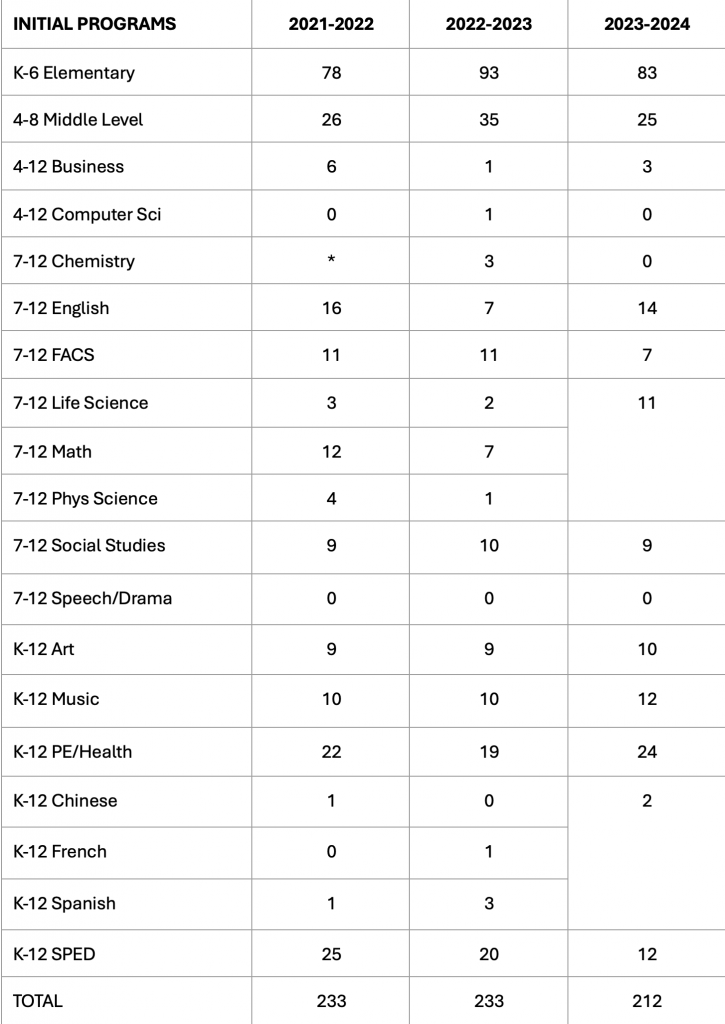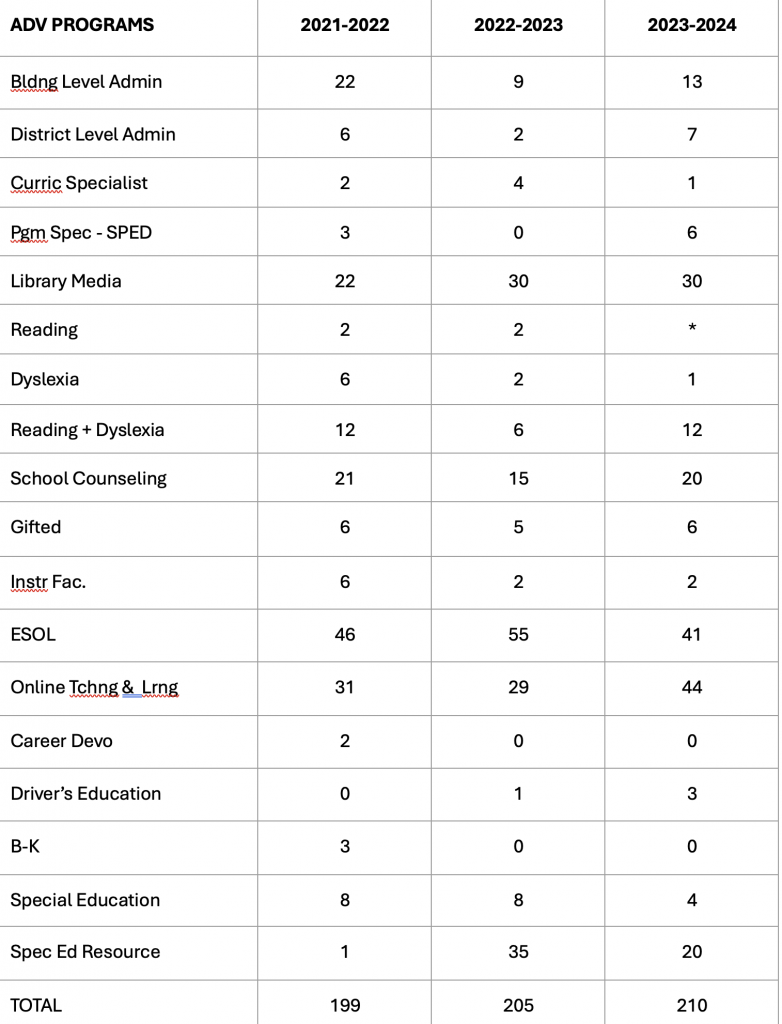Initial Teaching Licensure Programs
The EPP receives some data from the Arkansas Department of Elementary and Secondary Education (DESE) on completer impact. This report analyzes value-added growth scores (VAS) for University of Central Arkansas education program graduates across three cohorts (2021, 2022, and 2023) in English Language Arts, Mathematics, and Science. The VAS scores measure whether students taught by UCA graduates met, exceeded, or fell below expected academic growth, with a score of 80 representing expected growth. Overall, UCA’s teacher preparation program shows consistently solid performance, with most scores hovering around the expected growth benchmark of 80, though there are some variations by subject and year. The 2021 cohort shows improvement over time in ELA (from 79.41 to 81.44) but some decline in Science scores, while the 2023 cohort demonstrates strong initial performance, particularly in Math (80.00) and Science (80.75). The distribution charts reveal that UCA graduates’ performance generally aligns with statewide averages, with most teachers clustered around the 75-85 score range across all subjects.
- UCA’s traditional program generally received positive ratings across all four TESS domains, with most metrics showing blue percentage numbers (positive responses) between 83-89%.
- Areas of Strength: UCA’s program appears particularly strong in preparing teachers for professional responsibilities (Domain 4) and in specific Science of Reading components (lower end of rope).
- Areas for Potential Improvement: While still generally positive, UCA’s relatively lower scores (though still above 80% positive) were in these areas
- Classroom management areas (Domain 2)
- Managing student behavior (Domain 2)
- Designing, implementing, and interpreting assessments (Domain 1)
- Using questioning and discussion (Domain 3)
- These findings suggest UCA’s traditional EPP is effectively preparing teachers according to supervisor evaluations, with particular strengths in professional responsibilities and literacy instruction.

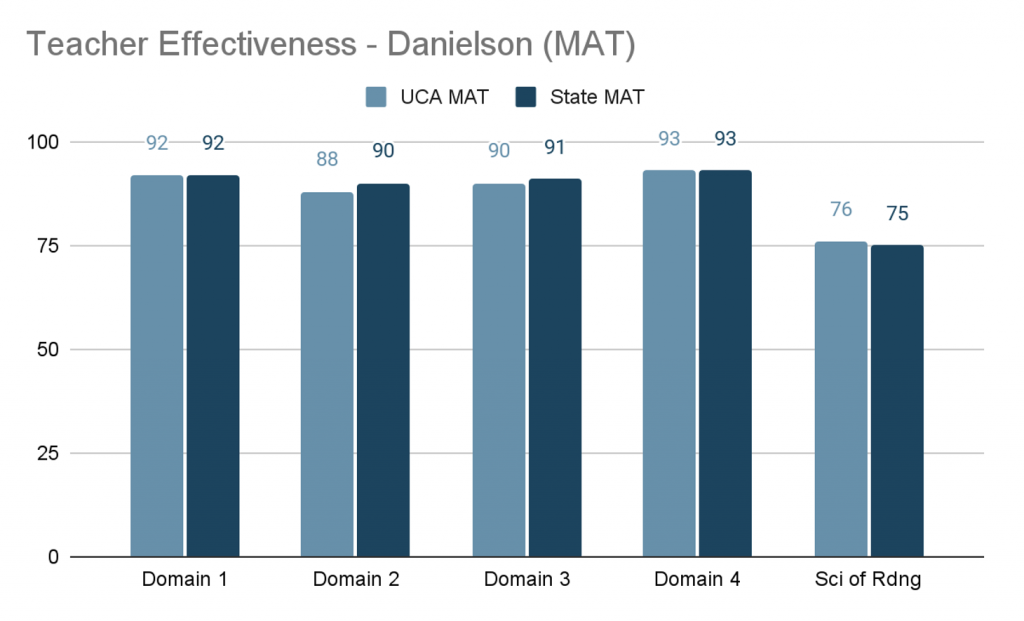
- The EPP is able to report EPP-specific aggregate and disaggregated data relative to the InTASC Standards based on a survey provided to employers of EPP completers 1- and 2- years post-graduation
- This survey is sent late spring term to all employers by the EPP with data analyzed over the summer term and shared to stakeholders in the fall term.
- Spring 2024 most competency areas received mean scores between 3.3 and 3.5 on the 4-point scale (where 3 = adequately prepared and 4 = well prepared), indicating that employers generally perceive UCA graduates as adequately to well-prepared teachers.
- This snapshot of Spring 2024 data suggests that UCA’s teacher preparation programs continue to adequately prepare graduates across most teaching competencies, with particular strengths in technology integration, professional development, and standards alignment. Potential areas for growth include behavior management skills and supporting students experiencing trauma.
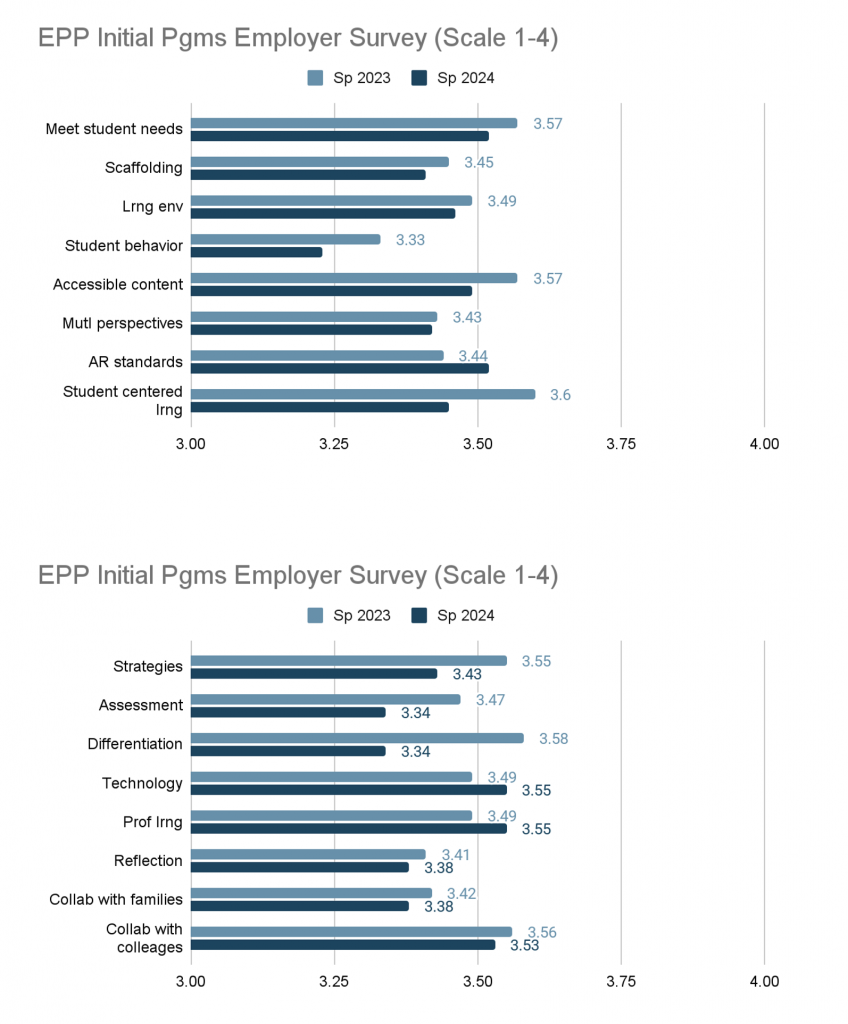
- Candidate pass rate on required content Praxis exams is tracked across programs by the Office of Candidate Services (OCS). Disaggregated program data are tracked for pass rates, mean score, standard deviation, and range
- Both initial and advanced programs report overall success in candidate ability to pass the required Praxis content exam(s) with many programs yielding pass rates at 90% and higher. For initial programs, changes to policy for “Gate 3” (admission to internship 2) have resulted in higher pass rates, notably for the K6 program. Candidates must now meet the ADE/AAP score for admission to Gate 3 (https://uca.edu/ocs/aap-provisional/). Additionally, the EPP has created several support and remediation structures for students struggling to pass their required exam(s) successfully, including: 240 Tutoring, Praxis Boot Camps (DESE grant), and state resources/tutoring programs. Undergraduate K6 Social Studies continues to be an area of focus for continuous improvement.
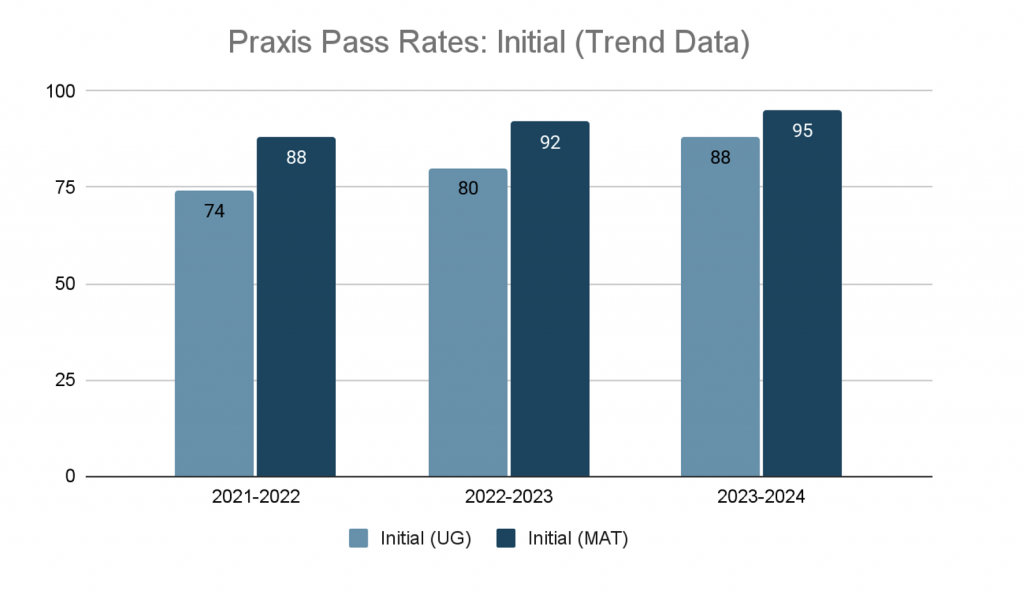
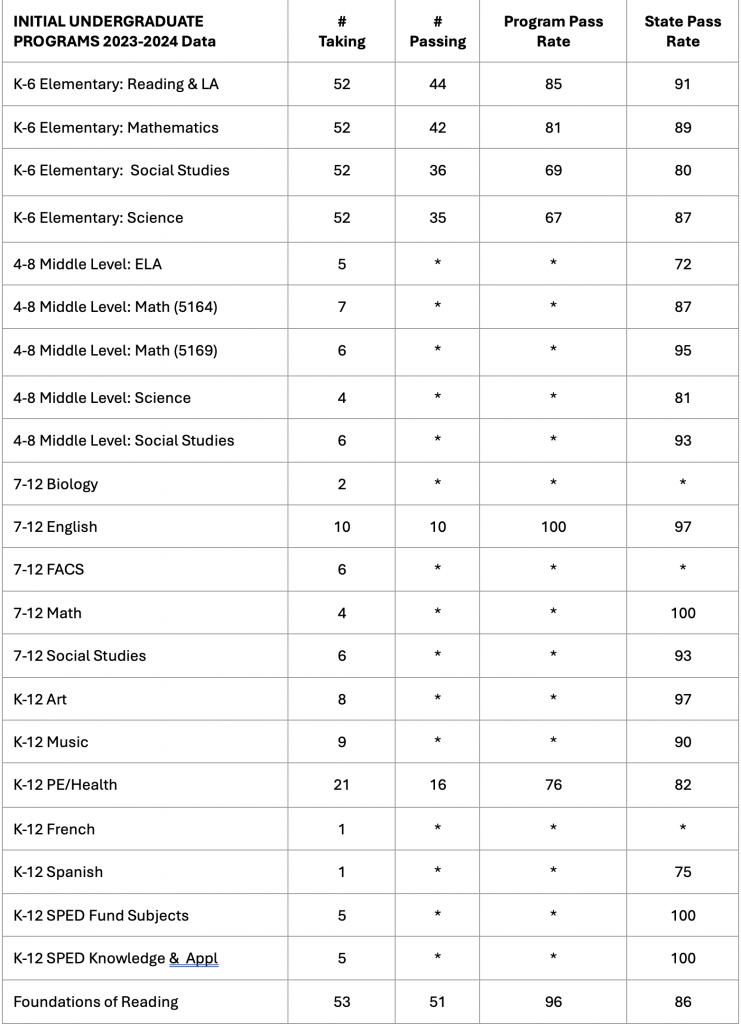
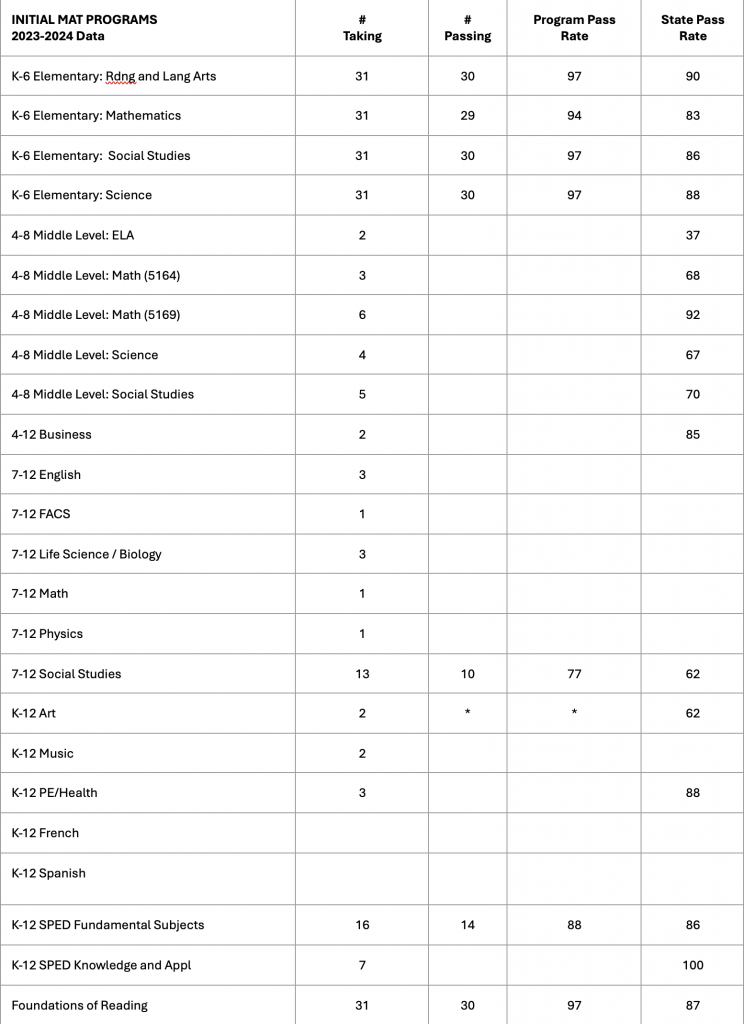
EPP gathers data on initial program completers’ employment and retention milestones in partnership with UCA Office of Institutional Research and in partnership with Arkansas Division of Elementary and Secondary Education.

Advanced Programs
- The EPP is able to report EPP-specific aggregate and disaggregated data relative to the CAEP Standards based on a survey provided to employers of EPP completers 1- and 2- years post-graduation
- This survey is sent late spring term to all employers by the EPP with data analyzed over the summer term and shared to stakeholders in the fall term.
- The overall results show strong employer satisfaction with UCA graduates from Advanced Programs. Across all measured skills, the university-wide means range from 3.54 to 3.85 on a 4-point scale, where 3 represents “adequately prepared” and 4 represents “well prepared.”
- The Summer 2024 employer satisfaction data indicates that UCA’s Advanced Programs are successfully preparing graduates, with mean scores consistently in the range between “adequately prepared” and “well prepared.” Technology integration appears to be a particular strength across programs, while responding to diverse stakeholders may present an opportunity for targeted improvement efforts.
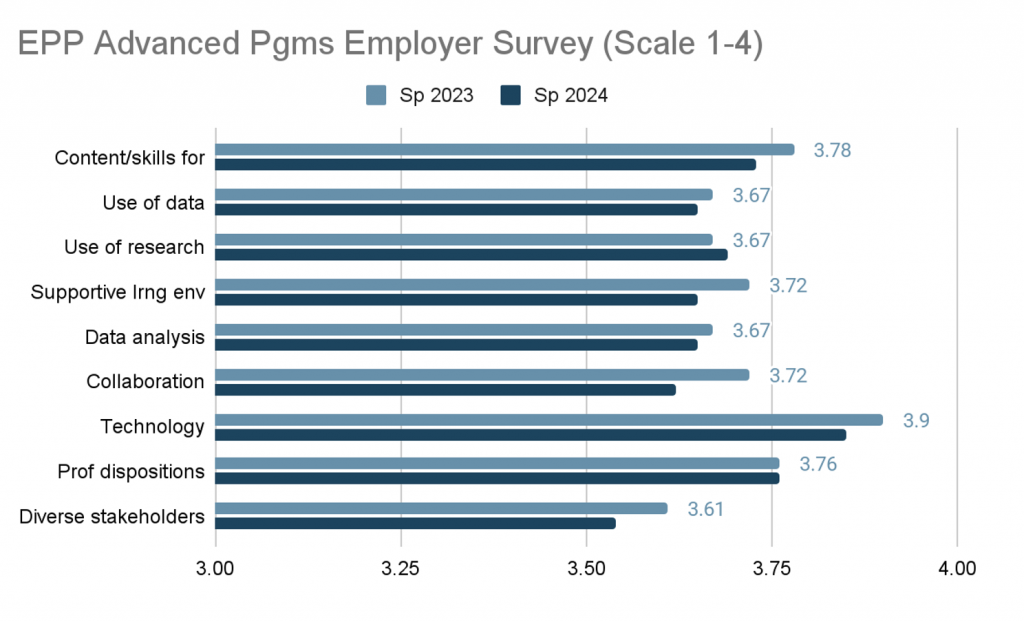
- Candidate pass rate on required content Praxis exams is tracked across programs by the Office of Candidate Services (OCS). Disaggregated program data are tracked for pass rates, mean score, standard deviation, and range
- Both initial and advanced programs report overall success in candidate ability to pass the required Praxis content exam(s) with many programs yielding pass rates at 90% and higher. For initial programs, changes to policy for “Gate 3” (admission to internship 2) have resulted in higher pass rates, notably for the K6 program. Candidates must now meet the ADE/AAP score for admission to Gate 3 (https://uca.edu/ocs/aap-provisional/). Additionally, the EPP has created several support and remediation structures for students struggling to pass their required exam(s) successfully, including: 240 Tutoring, Praxis Boot Camps (DESE grant), and state resources/tutoring programs. Undergraduate K6 Social Studies continues to be an area of focus for continuous improvement.
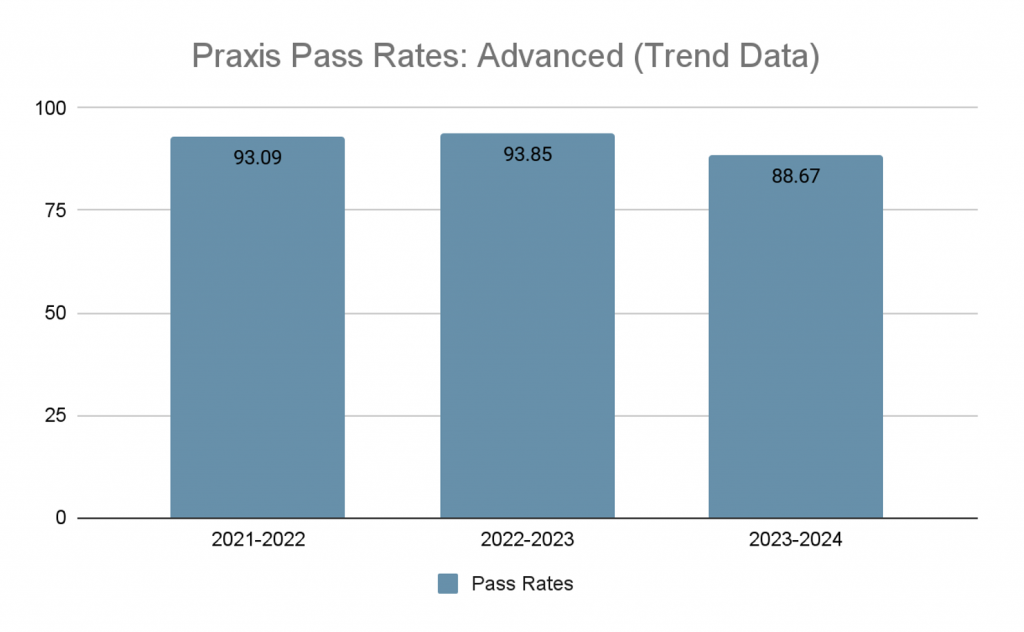
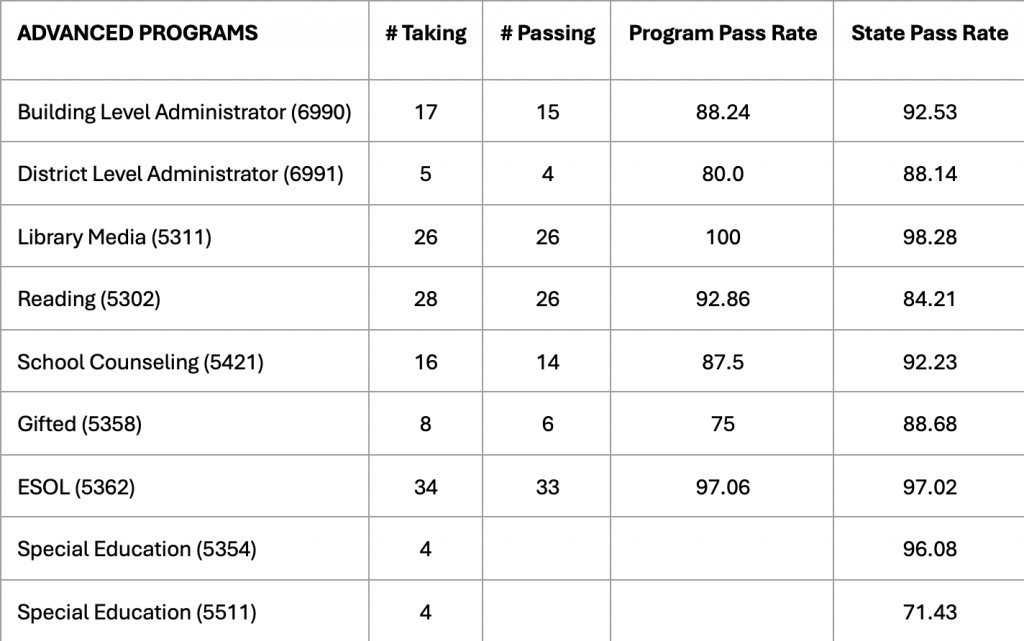
EPP gathers data on advanced program completers employment and retention milestones in partnership with UCA Office of Institutional Research

CAEP Report Archive
CAEP Annual Report (Spring 2023)
CAEP Annual Report (Spring 2022)
CAEP Annual Report (Spring 2021)
CAEP Annual Report (Spring 2020)
CAEP Annual Report (Spring 2019)
CAEP Annual Report (Spring 2018)
NCATE Accreditation Review (Fall 2011)
